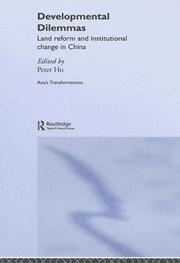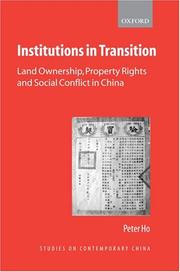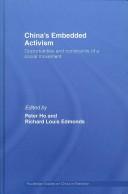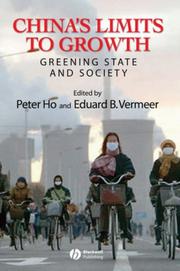| Listing 1 - 10 of 27 | << page >> |
Sort by
|

ISBN: 041549737X 0415362393 9780415362399 9780415497374 1280236728 9786610236725 0203012682 1134231539 9780203012680 9781134231539 9781134231485 1134231482 9781134231522 1134231520 Year: 2005 Publisher: London New York Routledge
Abstract | Keywords | Export | Availability | Bookmark
 Loading...
Loading...Choose an application
- Reference Manager
- EndNote
- RefWorks (Direct export to RefWorks)
Developmental Dilemmas singles out land as an object of study and places it in the context of one of the world's largest and most populous countries undergoing institutional reform: the People's Republic of China. The book demonstrates that private property protected by law, the principle of 'getting-the-prices-right', and the emergence of effectively functioning markets are the outcome of a given society's historical development and institutional fabric. Peter Ho argues that the successful creation of new institutions hinges in part on choice and timing in relation to the particular
S20/0450 --- China: Agriculture forestry, fishery, natural disasters--Land tenure and utilization: after 1949 --- China - Economic conditions - 2000-. --- Land tenure. --- Land tenure - China. --- Land tenure--China. --- Land use, Rural. --- Land use, Rural - China. --- Sustainable development - China. --- Land tenure --- Land use, Rural --- Sustainable development --- China --- Economic conditions

ISBN: 9780199280698 019928069X Year: 2006 Publisher: Oxford Oxford university press
Abstract | Keywords | Export | Availability | Bookmark
 Loading...
Loading...Choose an application
- Reference Manager
- EndNote
- RefWorks (Direct export to RefWorks)
S20/0700 --- China: Agriculture forestry, fishery, natural disasters--Communist land reform and agrarian policy --- Land tenure --- Land use, Rural --- Right of property --- Rural land use --- Land use --- Agriculture --- Government policy --- China --- Economic policy.
Book
ISBN: 1108505996 1108513441 1108514936 1108516424 1108523870 1316145611 1108517919 1107094100 1107476046 Year: 2017 Publisher: Cambridge : Cambridge University Press,
Abstract | Keywords | Export | Availability | Bookmark
 Loading...
Loading...Choose an application
- Reference Manager
- EndNote
- RefWorks (Direct export to RefWorks)
Why would the removal of authoritarian institutions in some developing countries lead to sustained socio-economic crisis, while others experience explosive growth despite 'persisting' informal, insecure and rent-seeking institutional arrangements? A key to solving this enigma lies in understanding China, a country where the paradoxes of development are highly visible. Peter Ho argues that understanding China's economy necessitates an analytical refocusing from Form to Function, detached from normative assumptions about institutional appearance and developing instead a 'Credibility Thesis'. In this reading, once institutions endogenously emerge and persist through actors' conflicting interactions, they are credible. Ho develops this idea theoretically, methodologically, and empirically by examining institutions around the sector that propelled, yet, simultaneously destabilizes development: real estate - land, housing and natural resources. Ho shows how this sector can further both our understanding of institutions and issues of capital, labor, infrastructure and technology.
Land use --- Housing --- Natural resources --- National resources --- Resources, Natural --- Resource-based communities --- Resource curse --- Land --- Land utilization --- Use of land --- Utilization of land --- Economics --- Land cover --- Landscape assessment --- NIMBY syndrome --- Management. --- Economic aspects --- China --- Economic policy
Book
ISBN: 9789044506198 Year: 2007 Publisher: Breda De Geus
Abstract | Keywords | Export | Availability | Bookmark
 Loading...
Loading...Choose an application
- Reference Manager
- EndNote
- RefWorks (Direct export to RefWorks)
Book
ISBN: 9781107094109 9781316145616 9781107476042 Year: 2017 Publisher: Cambridge Cambridge University Press
Abstract | Keywords | Export | Availability | Bookmark
 Loading...
Loading...Choose an application
- Reference Manager
- EndNote
- RefWorks (Direct export to RefWorks)
"Peter Ho argues that understanding China's economy necessitates an analytical refocusing from Form to Function, detached from normative assumptions about institutional appearance and developing instead a "Credibility Thesis". In this reading, once institutions endogenously emerge and persist through actors' conflicting interactions, they are credible. Ho develops this idea theoretically, methodologically, and empirically by examining institutions around the sector that propelled, yet, simultaneously destabilizes development: real estate - land, housing and natural resources. Ho shows how this sector can further both our understanding of institutions and issues of capital, labor, infrastructure and technology"--
Land use --- Housing --- Natural resources --- Management --- China --- Economic policy
Book
ISBN: 0191535745 1435619404 9786611190897 1281190896 Year: 2005 Publisher: Oxford : Oxford University Press,
Abstract | Keywords | Export | Availability | Bookmark
 Loading...
Loading...Choose an application
- Reference Manager
- EndNote
- RefWorks (Direct export to RefWorks)
China's urban sprawl has led to serious social cleavages. Unclear land and property rights have resulted in an uneasy alliance between real estate companies and local authorities, with most willing to strike illegal deals over land. The results have been devastating. Farmers live in fear that the land they till today will be gone tomorrow, while urban citizens are regularly evicted from their homes to make way for new skyscrapers and highways.These shocking incidents underscore the urgency of the land question in China. The recent conviction of the Chinese Minister for Land Resources and the f
Land tenure --- Social conflict --- New business enterprises --- Social aspects --- China --- Economic policy.
Book
Year: 2003 Publisher: London: Cass,
Abstract | Keywords | Export | Availability | Bookmark
 Loading...
Loading...Choose an application
- Reference Manager
- EndNote
- RefWorks (Direct export to RefWorks)
Dissertation
Abstract | Keywords | Export | Availability | Bookmark
 Loading...
Loading...Choose an application
- Reference Manager
- EndNote
- RefWorks (Direct export to RefWorks)

ISBN: 9780415433747 0415433746 9780203946442 9781134080496 9781134080533 9781134080540 9780415666503 Year: 2007 Publisher: New York : Routledge,
Abstract | Keywords | Export | Availability | Bookmark
 Loading...
Loading...Choose an application
- Reference Manager
- EndNote
- RefWorks (Direct export to RefWorks)
Environmentalism --- Social movements --- S06/0500 --- S11/0497 --- S11/0540 --- S20/0500 --- Movements, Social --- Social history --- Social psychology --- Environmental movement --- Anti-environmentalism --- Sustainable living --- China: Politics and government--Other modern political movements (e.g. anarchism, Socialism, dissident movements, Beijing Spring, Tian'anmen) --- China: Social sciences--Society since 1976 --- China: Social sciences--The Chinese model --- China: Agriculture forestry, fishery, natural disasters--Environmental policy, pollution --- Civil society --- Greenwashing --- Mouvements sociaux --- Environnementalisme --- Société civile --- Chine

ISBN: 9781405153904 Year: 2006 Publisher: Oxford Blackwell
Abstract | Keywords | Export | Availability | Bookmark
 Loading...
Loading...Choose an application
- Reference Manager
- EndNote
- RefWorks (Direct export to RefWorks)
| Listing 1 - 10 of 27 | << page >> |
Sort by
|

 Search
Search Feedback
Feedback About UniCat
About UniCat  Help
Help News
News